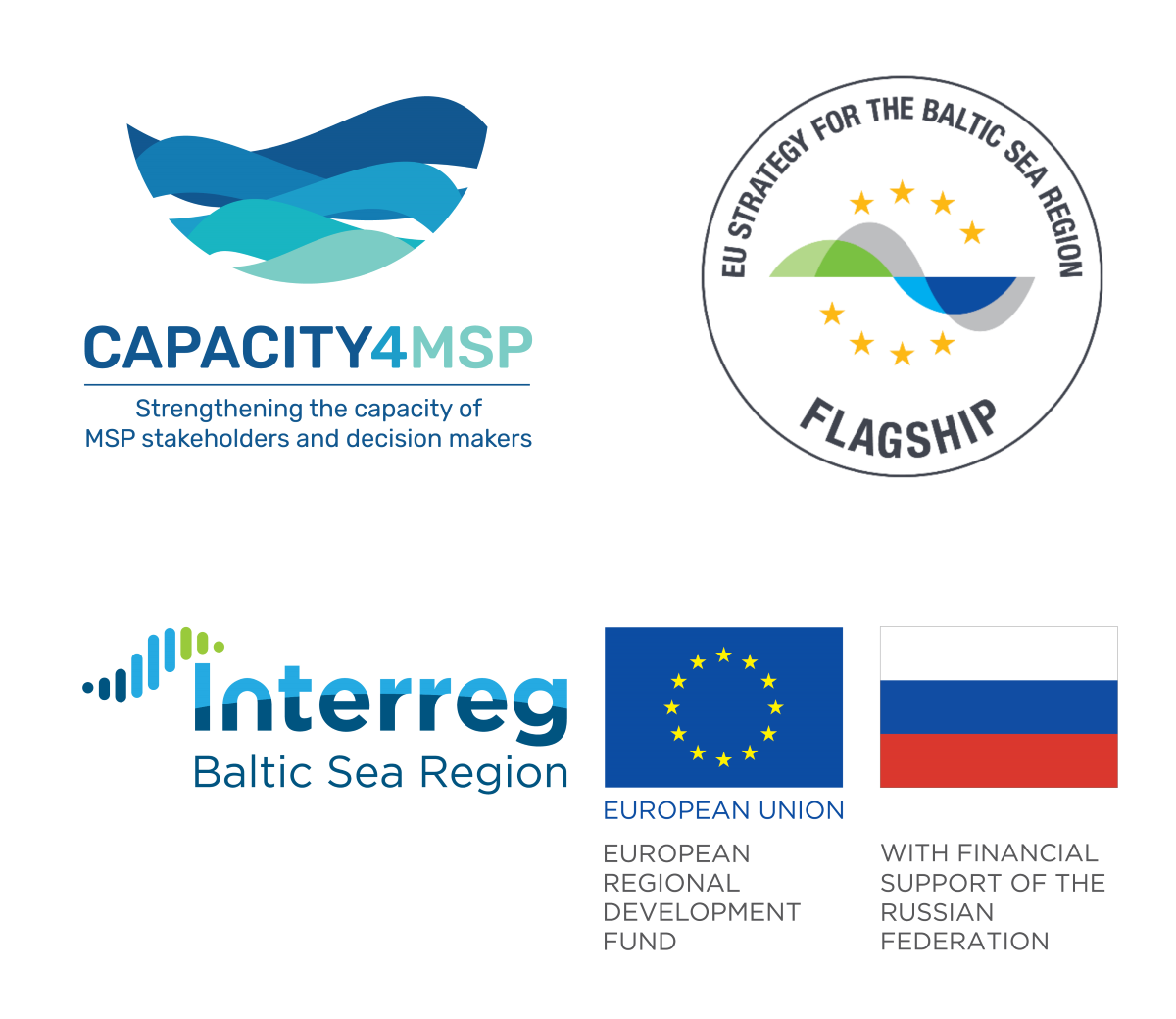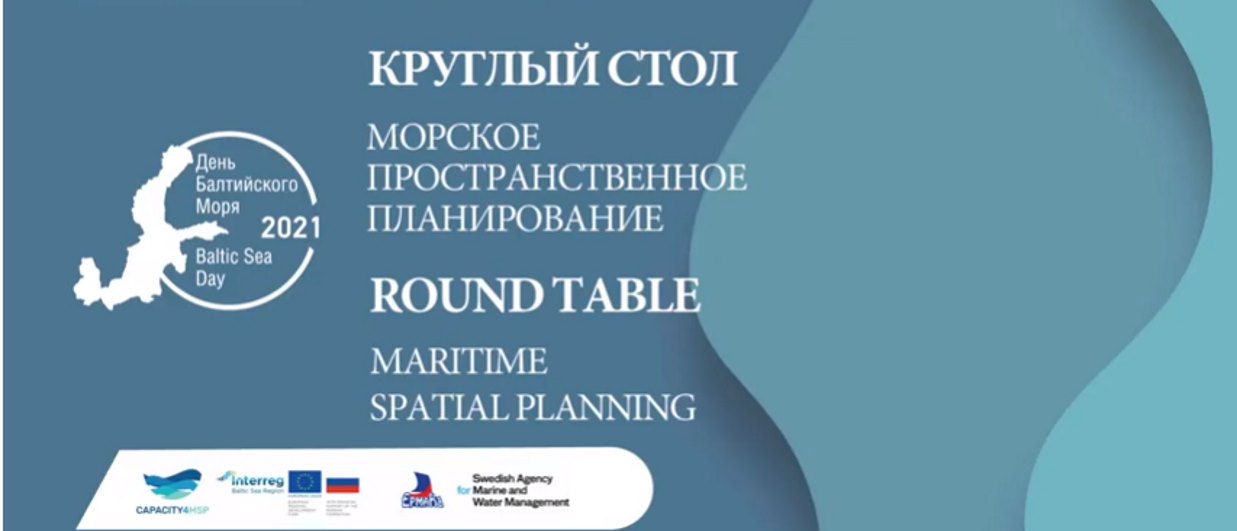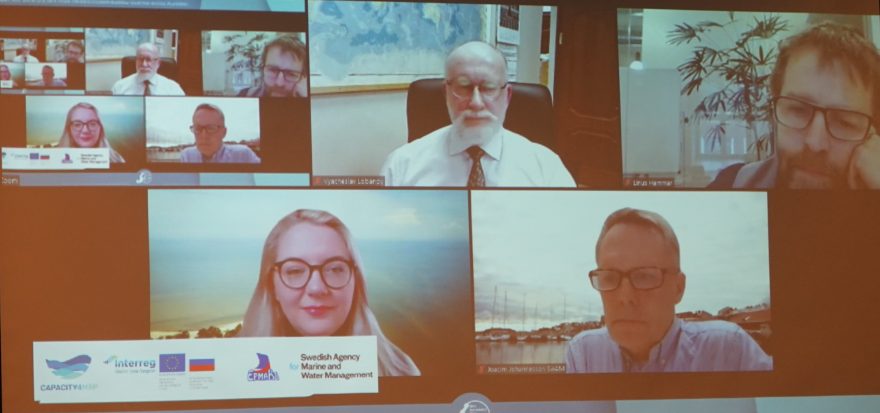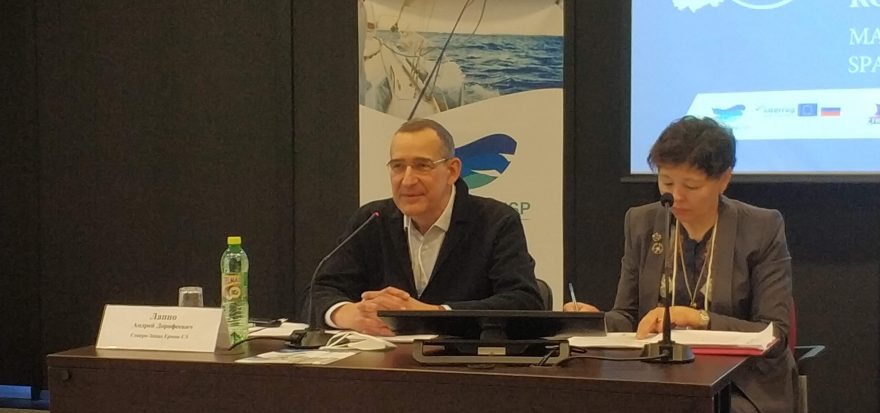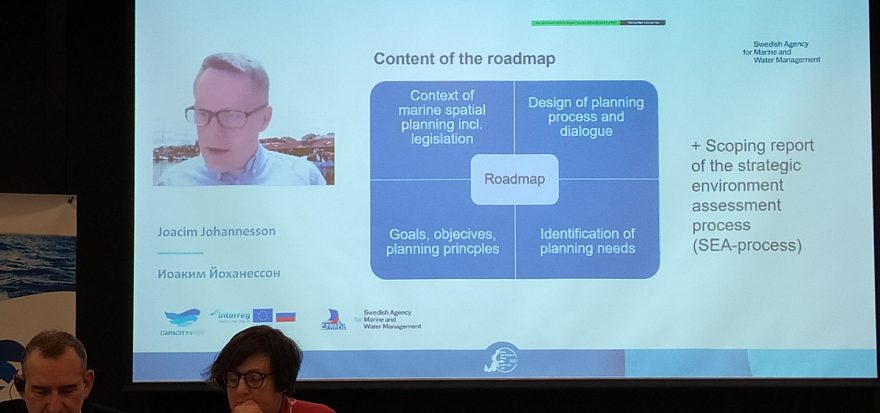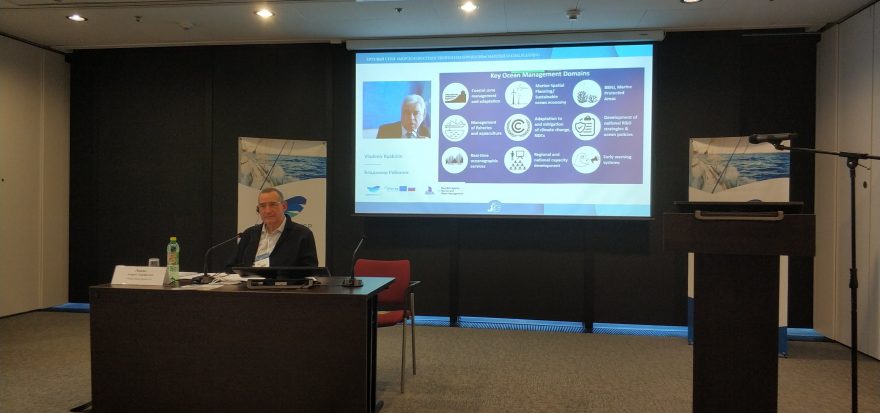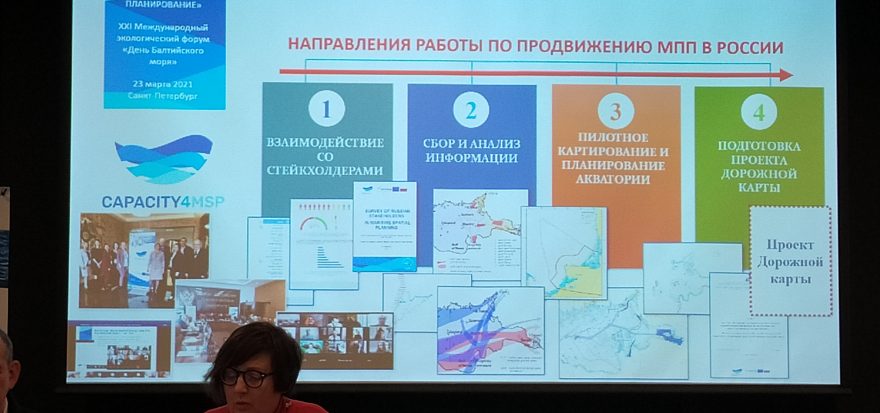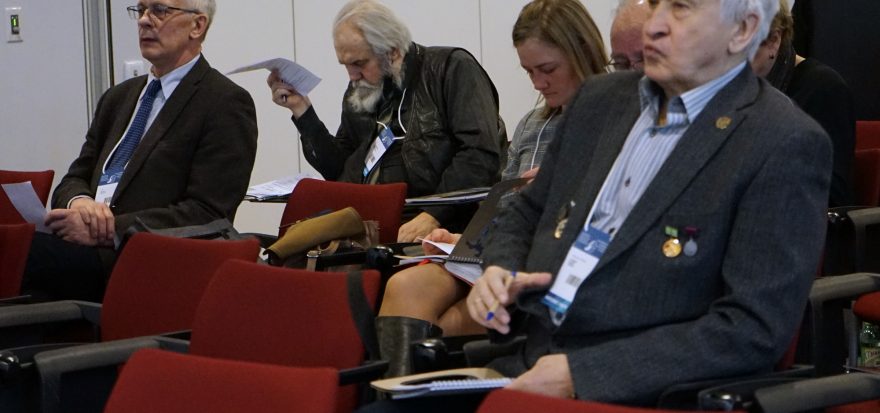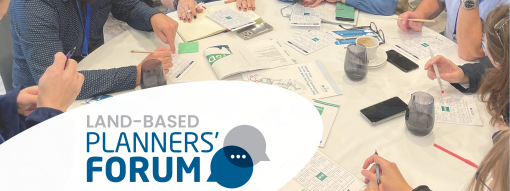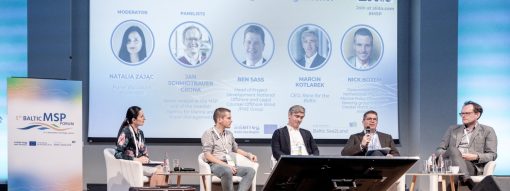Maritime Spatial Planning roundtable at the Baltic Sea Day
The Roundtable “Maritime Spatial Planning” was held within the framework of the XXI International Forum “Baltic Sea Day” on March 23, 2021 in St. Petersburg and online. The roundtable was organized by the Scientific and Research Institute of Maritime Spatial Planning Ermak NorthWest (Russia), SC Mineral (Russia) and the Swedish Agency for Marine and Water Management (Sweden).
The roundtable was held in a hybrid format and brought together about 100 participants, including 25 in person, 27 on the Zoom platform and more than 50 via the YouTube broadcast. The broadcast of the roundtable is available at the Youtube link HERE.
The roundtable participants were greeted by Natalya Tretyakova, the representative of the Ministry of Natural Resources and Ecology of the Russian Federation, Lev Klyachko, Chair of the Scientific and Expert Council of the Maritime Board at the Government of the Russian Federation, and co-moderators Andrey Lappo (EkrmakNW) and Ingela Isaksson (SwAM). In total, fifteen speakers represented five countries – Russia, Sweden, Romania, Germany and China and two international organizations – IOC UNESCO and VASAB.
The roundtable consisted of two main sessions: “Towards Russian MSP Roadmap” and “Sweden MSP and Symphony Analysis Tool”. In addition, a survey of participants was conducted on the most significant issues of support and promotion of the MSP in Russia, and speeches by representatives of authorities and from civil society organizations were heard.
Session “Towards Russian MSP Roadmap”
In key opening speech, the Executive Secretary of the Intergovernmental Oceanographic Commission (IOC) of UNESCO, Vladimir Ryabinin (Paris, France), presented the tasks of the UN Decade of Ocean Sciences for Sustainable Development and the IOC UNESCO MSPGlobal initiative to promote maritime spatial planning in the world and welcomed the development of the Russian MSP Roadmap. One of the UN goals is to ensure that by 2025, 100% of the sea areas under the jurisdiction of the countries are managed sustainably and include management plans for the exclusive economic zones.
Inga Jēkabsone, representative of the VASAB secretariat (Riga, Latvia), spoke about the content and progress of the Capacity4MSP project-platform, within which the Russian project partners are developing Russian MSP Roadmap.
Andrei Lappo and Larisa Danilova (Scientific and Research Institute of Maritime Spatial Planning Ermak NorthWest, St. Petersburg, Russia) reported on the progress of MSP in Russia and the development of the Russian MSP Roadmap, including data collection, preparation of substantiating reports and interaction with stakeholders. MSP workshops for stakeholders were held in Moscow, St. Petersburg, Kaliningrad, Murmansk, Vladivostok and Novorossiysk. Further, it is planned to hold a number of Russian and international roundtables to present MSP Roadmap, including the Caspian Sea.
Gerold Janssen (Leibniz Institute of Ecological Urban and Regional Development, Germany), Laura Alexandrov and Tatiana Begun (NIMRD and GeoEcoMar , Romania), Qinhua Fang (COMI, Xiamen University, China) shared their national experience in the MSP development, best practices in the application of the ecosystem approach, regional features of maritime spatial plans.
Vyacheslav Lobanov and Yana Blinovskaya (POI FEB RAS and FEFU, Vladivostok, Russia) drew the participants’ attention to the need to form regional databases on the ocean, talked about the Far Eastern seas and stressed the importance of international cooperation and joint efforts of all coastal countries in the maritime direction for sustainable management.
Aleksandr Balyberdin, Galina Baturova, Aleksey Konovalov, Mikhail Kotenev (RTU MIREA, Scientific and Expert Council of the Maritime Board at the Government of the Russian Federation, Moscow, Russia) spoke about the need to improve the system of integrated management of maritime activities at the regional level, which requires the transfer to the regional level of some of the national powers for public administration of the marine activities.
Alexey Knizhnikov and Margarita Leskova (WWF-Russia) made a report on the growth of anthropogenic pressure on the Arctic waters using the example of the Pechora Sea and the need to regulate it based on MSP tools and the importance of applying the ecosystem-based approach.
Marina Ulyanova and Leila Bashirova, (AO IO RAS, Kaliningrad, Russia) presented proposals on the use of MSP tools for the integrated management of the marine cultural heritage of the Kaliningrad region.
Vera Semeoshenkova, Nikolai Plink, Tatyana Eremina, Alexandra Ershova, Ivan Mushket, (RSHU, St. Petersburg, Russia) spoke about barriers to the implementation of maritime spatial planning in the Russian Federation and ways to overcome them.
Session “Sweden MSP and Symphony Analysis Tool”
Joacim Johannesson (Swedish Agency for Marine and Water Management, Gothenburg, Sweden) presented the objectives and content of the Swedish MSP, which was completed by the agency in 2019 and to be decided by the government early 2021. The report highlighted the importance of interaction between different levels of government and dialogue with stakeholders at all stages of planning process.
Linus Hammar (Swedish Agency for Marine and Water Management, Gothenburg, Sweden) spoke about the development of a cumulative environmental impact assessment tools and Symphony data analysis tool, which was successfully applied in the assessment of Swedish MSP. The developers managed to collect a sufficient amount of initial information, which made it possible to carry out a reliable assessment of the total anthropogenic impact, including offshore wind energy. In addition, this tool has been tested by other countries. For example, in the application of Symphony in the waters of countries on the East African coast, the lack of data significantly complicated its use, although in this case it was possible to obtain a relatively reliable result. The tool has great potential and can be further developed in the interests of all Baltic States, including it can be tested in Russia both for the sea and coastal area and for the river basin.
SUMMARY
Participants of the Roundtable:
- discussed the progress in the development of the Russian MSP Roadmap and the active involvement of scientific and research institutes, public authorities and organizations in the coastal regions of Russia;
support the introducing of MSP into the strategic planning system of Russia and coastal regions and the efforts of developers to develop Russian MSP Roadmap; - request the Maritime Board at the Government of the Russian Federation to familiarize themselves with the materials of the Russian MSP Roadmap and, if approved, to ask the Scientific and Expert Council of the Board Collegium to further coordinate the development and implementation of the Roadmap and to support the MSP promotion in the Russian Federation.
- welcome the progress in the development of maritime spatial plans of the leading maritime countries all over the world, including neighboring countries on all border seas and oceans of Russia, and draw attention to the serious lag of the Russian Federation in the field of MSP;
- consider it necessary to include MSP and rational use of marine resources in the Russian program of the UN Decade of Ocean Sciences for Sustainable Development and to support Russia’s accession to the UNESCO IOC MSPGlobal initiative;
- note the importance of continuous communication and exchange of experience between MSP planners and stakeholders at all levels from the very beginning of maritime spatial planning process, including transboundary and interregional cooperation;
- pay attention to the need to improve the education and training of MSP specialists, including the development of international educational programs for students / experts from different countries according to mutually agreed training programs;
- consider it advisable to develop and use new integrated tools to support decision-makers, for integrated assessment of the impact on various ecosystems such as Symphony;
- support the work of international organizations HELCOM and VASAB to promote MSP in the Baltic Sea Region, to formulate a new BSR MSP Roadmap, aimed at further consolidating the efforts of Baltic States in the protection and sustainable use of marine resources and inclusion of maritime spatial planning in the Baltic Sea Helcom Action Plan.
